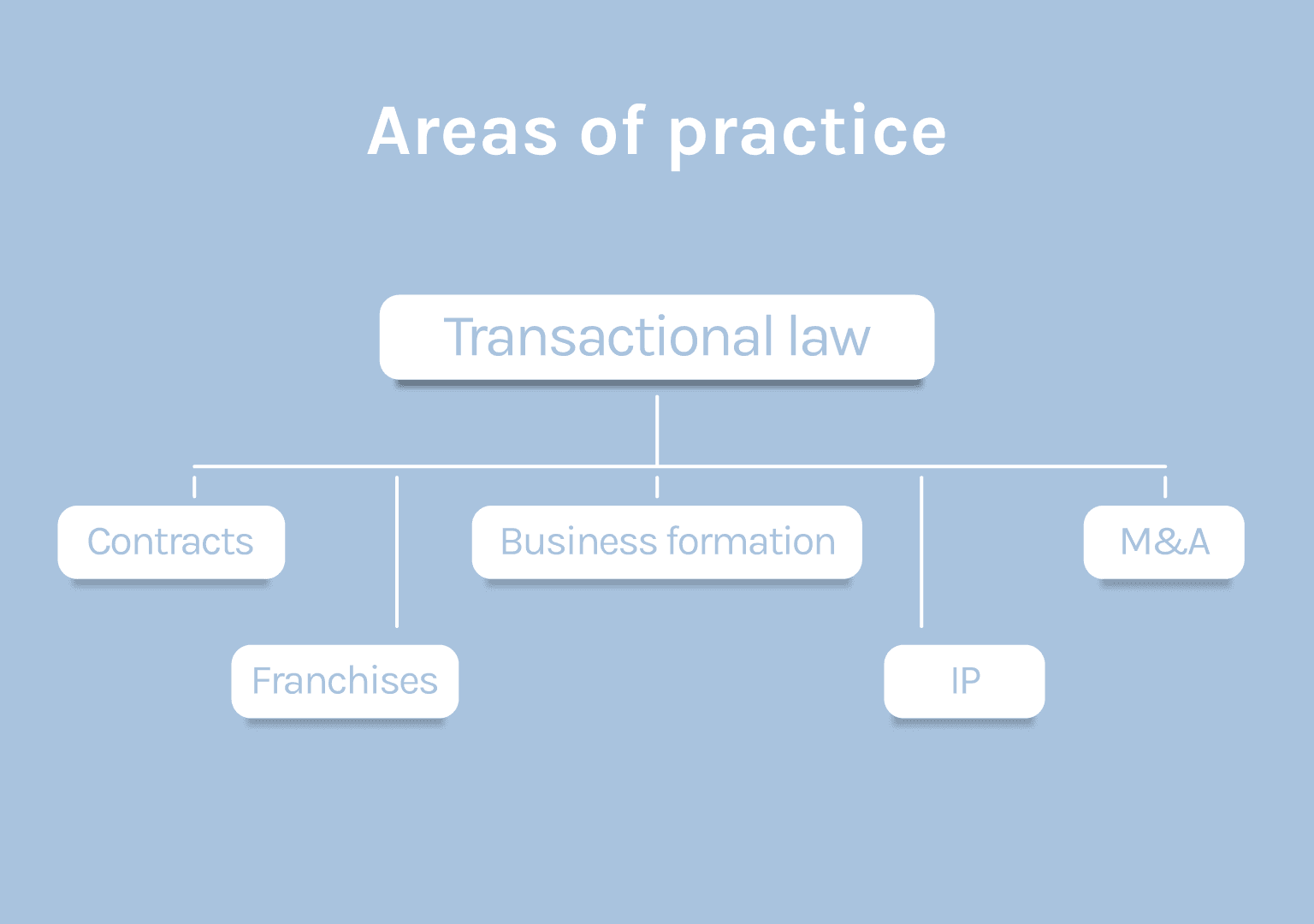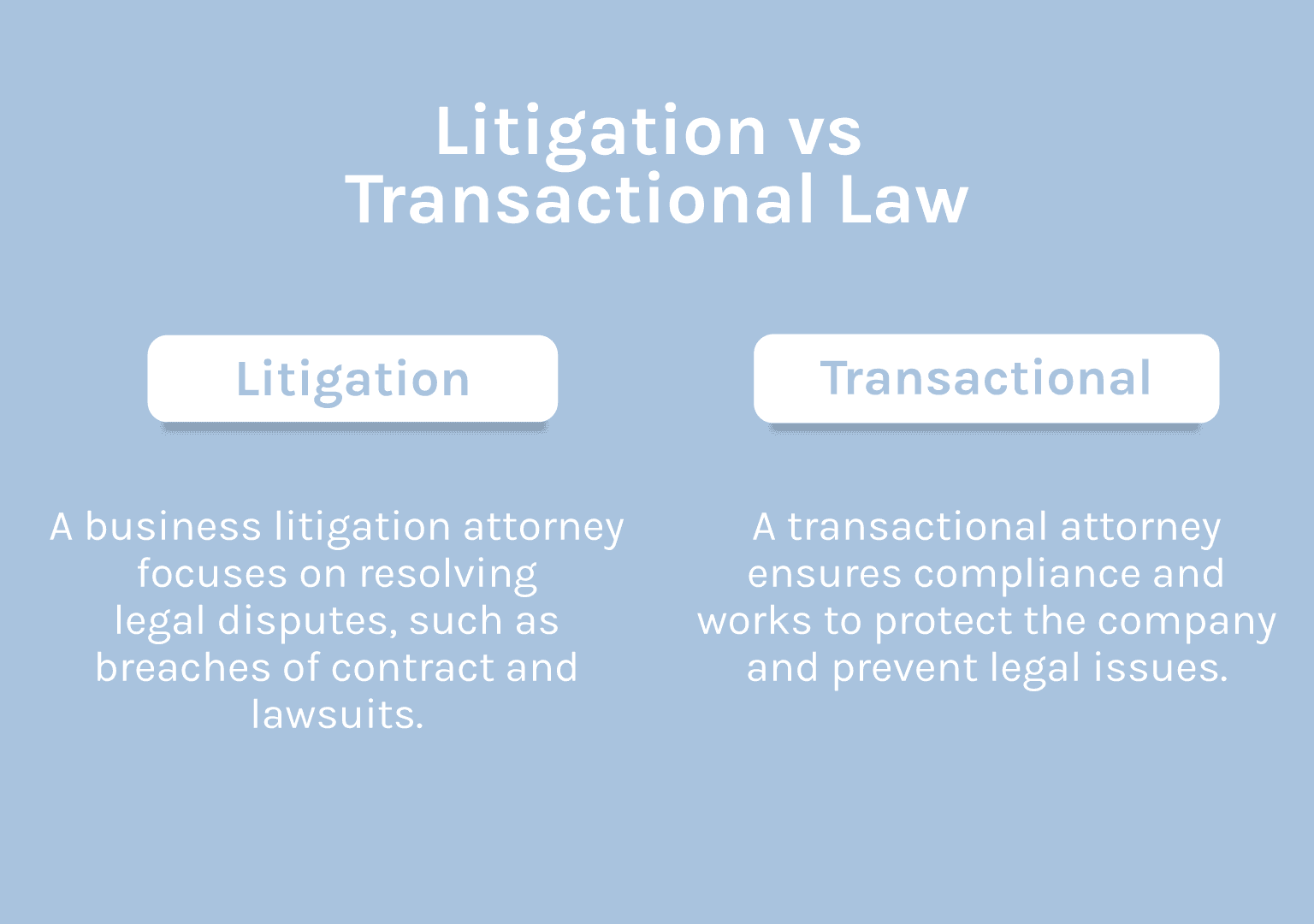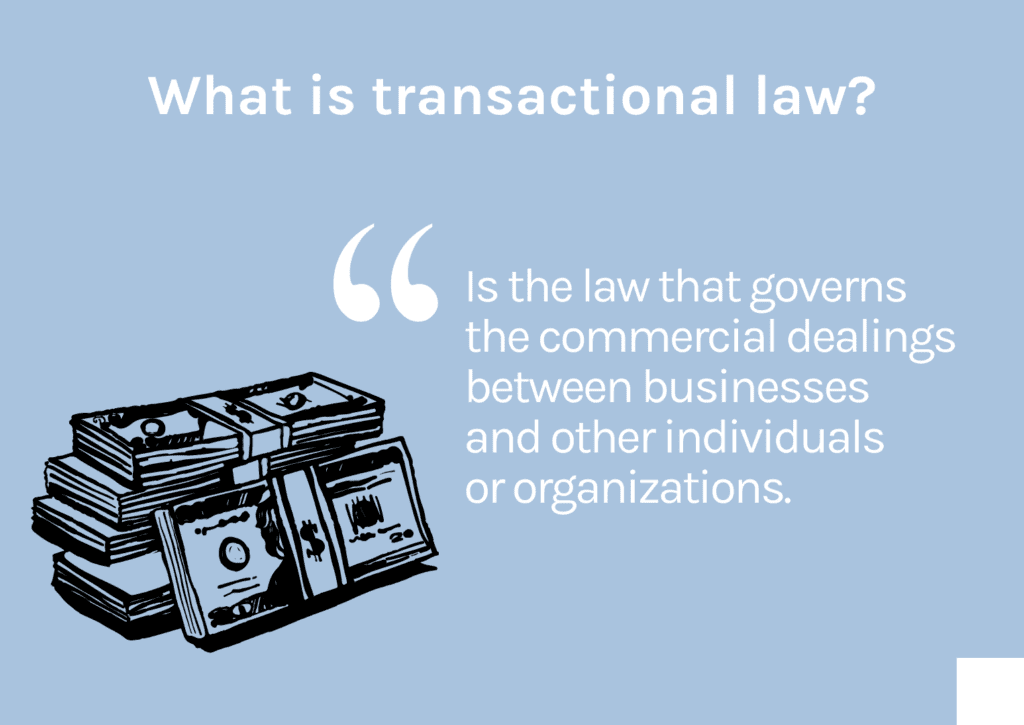What is transactional law?
Transactional law refers to the legal practices that guide commercial dealings between businesses and other companies, individuals, or organizations. This area of business law governs the planning, negotiation, and document drafting related to the transfer of goods, services, or financial assets in return for money.
Transactional law focuses on the formation, negotiation, documentation, and consummation of business deals. Therefore, transactional lawyers work to protect the interests of business owners by minimizing the potential legal pitfalls derived from transactions by setting up the proper documentation and contracts.
Areas of practice

Transactional law covers a broad range of areas, for which transactional attorneys usually specialize in some particular areas. The following are the types of transactional law you can find:
Corporate law
Corporate legal services are related to the formation and management of business entities. Selecting the structure of a company is one of the key decisions when starting a business, for it will determine the extent of liability and taxation concerns. A business attorney will help entrepreneurs choose between LLCs, corporations, or the entity that best fits the objectives of the company.
Transactional lawyers intervene from the start of a business. They help business owners select the most adequate business entity, prepare the documentation, provide guidance in licensing, draft and review the business agreements, and take the necessary steps to set up the business.
Intellectual Property
Business lawyers also deal with the protection of patents, copyrights, trademarks, trade secrets, or other forms of intellectual property. A transaction lawyer will ensure the IP of a business is not stolen and protect them against unauthorized use of their creativity. An IP lawyer can assist with licensing and registration matters, drafting distribution agreements, and other activities that protect the intellectual assets of a business.
Commercial Law
The pivotal part of any business transaction is the agreement that gives validity to the deal. This is where contracts come in. A transactional lawyer will negotiate, review and draft agreements to ensure they are structured in the best interest of the client, are enforceable and offer protection against lawsuits, disputes, or other liabilities.
Mergers and Acquisitions
When buying or selling a business, the parties involved in the deal must rely heavily on a business lawyer. A business acquisition attorney will ensure the business transaction is taken properly by conducting due diligence, drafting the corresponding purchase agreements, and handling the documentation for a seamless transition.
Franchises
The process of franchising is complex since its regulations can vary according to the state and other factors. A franchise attorney can help both franchisors and franchisees to have a mutually beneficial agreement. On the franchisor side, a transactional attorney will put safeguards to protect the intellectual property of the business and start the franchising process. On the other side, the attorney will review the franchise agreements to ensure the franchisee is entering a fair deal.
What does a transactional lawyer do?
The role of a transactional lawyer in a business is to ensure a solid foundation and legal compliance and to implement legal strategies that minimize the risks of a business.
With the proper guidance, business owners can adhere to the established legal procedures and avoid liabilities.
A corporate transactional lawyer assists companies in matters related to:
- Business formation and entity selection
- Drafting, reviewing, and negotiating of contracts
- Carrying out M&A due diligence
- Employment matters
- Intellectual property protection
- General legal counsel and compliance
- Franchising
- Commercial agreements
- Private Equity
Litigation vs Transactional Law

As mentioned, transactional law sets a solid foundation for businesses so they can successfully get involved in commercial agreements. On the other hand, litigation focuses on resolving legal disputes that arise from business transactions. A litigation attorney will manage lawsuits, business disputes, breaches of contracts, and related business concerns.
Simply put, a business litigation attorney will provide legal representation to resolve disputes, while a transactional attorney will work to prevent these legal issues from happening.
When should you hire a transactional lawyer?
The assistance of a transaction attorney is recommended from the start of a business. A transactional lawyer can provide the guidelines to ensure the business operations abide by the law and that the company is protected from potential lawsuits and other liabilities.
A small business can always use the assistance of a transaction lawyer, regardless of the industry it operates in. Corporate transactional lawyers can advise businesses in manufacturing, technology, healthcare, food, services, or other industries and write contracts that adapt to their sector.
If you plan to get involved in any agreement, a business attorney will be a great support to analyze if the agreement benefits you and what measures can be taken to protect your business and reduce liability.
The assistance of a transactional attorney is of the utmost importance in mergers and acquisitions, as the lawyer will set the framework of the business purchase and provide the tools to ensure a smooth transaction.
The benefits of hiring a transactional lawyer
- Avoid legal problems: A business lawyer will ensure your business is set up to have a healthy relationship with the government, other businesses, and its customers. The attorney will also clearly establish the rights and responsibilities of the business owners to avoid any internal disputes. With appropriate legal guidance, a transactional attorney will avoid headaches and unnecessary money waste.
- Strategic planning: A contract can be a great opportunity to expand the operations of a business and push it to its growth. With a strategic contract, a business can get involved in beneficial agreements that will result in profit. A transaction lawyer can help you negotiate agreements to help you get the best deal.
- Protection: A corporate lawyer can spot the weaknesses of your business and provide safeguards to protect it from hazards. With legal assistance, you can ensure your physical and intellectual assets are safe.
What to look for in a transactional lawyer
Since a corporate transactional lawyer will work to ensure the protection of your business, she needs to have a broad experience and knowledge in contract and commercial law. These are some skills and qualities you must look in a transactional lawyer:
- Negotiation: Through an efficient contract negotiation, the lawyer is able to defend your interests, get you the deal that benefits you the most, and ensure all parties are satisfied.
- Analytical skills: Experience in the industry provides the attorney the capacity to spot common problems, but also potential issues and areas of opportunity of the business and reflect it on the contracts.
- They understand you and your business: Your business is just one extension of you. A worthy transactional lawyer will take the time to learn your personal objectives and how they fit into your company. The attorney should be able to understand the operations of your business and the specific needs it has according to its industry and your situation.
- Their services are strategic: A worthy transactional lawyer will align the services they provide to your objectives and aim to the growth of a business. The lawyer will not use a standard contract, they will draft one that addresses specific concerns, protects your interests, and prevents future issues.
- They are responsive and communicative: Look for a business lawyer that constantly informs you about the progress of your transactions. Also, that is willing to listen to your concerns, explain how the provided services will help you, and is open to adapt the contract according to your convenience.
Do you need a transactional attorney?
Our transactional lawyers will handle your commercial affairs in your best convenience. With strategic contracts that will keep you protected, our firm will handle your business transactions, so you only focus on your business. Call (630) 517-5529 and schedule a consultation.


